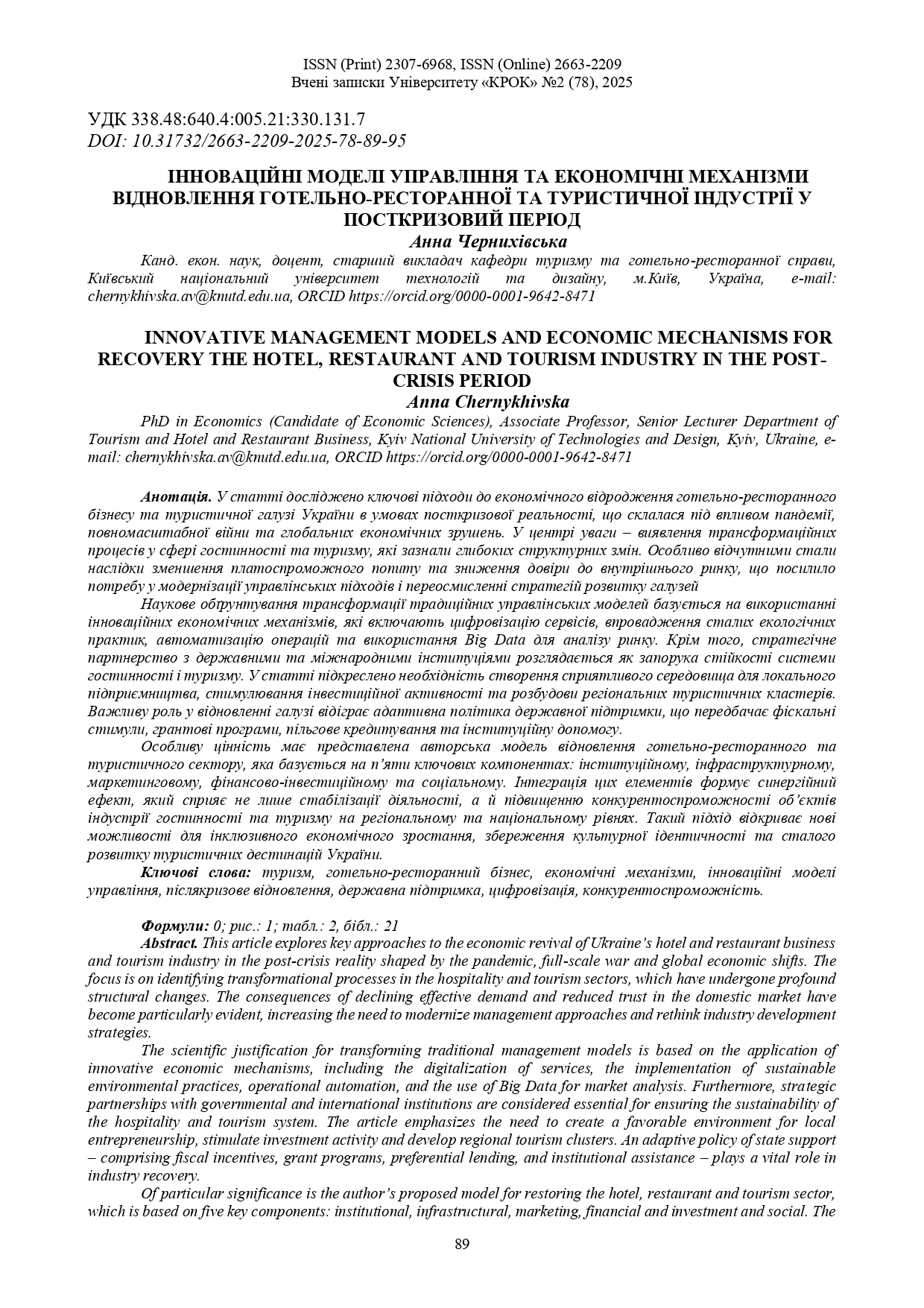ІННОВАЦІЙНІ МОДЕЛІ УПРАВЛІННЯ ТА ЕКОНОМІЧНІ МЕХАНІЗМИ ВІДНОВЛЕННЯ ГОТЕЛЬНО-РЕСТОРАННОЇ ТА ТУРИСТИЧНОЇ ІНДУСТРІЇ У ПОСТКРИЗОВИЙ ПЕРІОД
DOI:
https://doi.org/10.31732/2663-2209-2025-78-89-95Ключові слова:
туризм, готельно-ресторанний бізнес, економічні механізми, інноваційні моделі управління, післякризове відновлення, державна підтримка, цифровізація, конкурентоспроможністьАнотація
У статті досліджено ключові підходи до економічного відродження готельно-ресторанного бізнесу та туристичної галузі України в умовах посткризової реальності, що склалася під впливом пандемії, повномасштабної війни та глобальних економічних зрушень. У центрі уваги – виявлення трансформаційних процесів у сфері гостинності та туризму, які зазнали глибоких структурних змін. Особливо відчутними стали наслідки зменшення платоспроможного попиту та зниження довіри до внутрішнього ринку, що посилило потребу у модернізації управлінських підходів і переосмисленні стратегій розвитку галузей
Наукове обґрунтування трансформації традиційних управлінських моделей базується на використанні інноваційних економічних механізмів, які включають цифровізацію сервісів, впровадження сталих екологічних практик, автоматизацію операцій та використання Big Data для аналізу ринку. Крім того, стратегічне партнерство з державними та міжнародними інституціями розглядається як запорука стійкості системи гостинності і туризму. У статті підкреслено необхідність створення сприятливого середовища для локального підприємництва, стимулювання інвестиційної активності та розбудови регіональних туристичних кластерів. Важливу роль у відновленні галузі відіграє адаптивна політика державної підтримки, що передбачає фіскальні стимули, грантові програми, пільгове кредитування та інституційну допомогу.
Особливу цінність має представлена авторська модель відновлення готельно-ресторанного та туристичного сектору, яка базується на п’яти ключових компонентах: інституційному, інфраструктурному, маркетинговому, фінансово-інвестиційному та соціальному. Інтеграція цих елементів формує синергійний ефект, який сприяє не лише стабілізації діяльності, а й підвищенню конкурентоспроможності об’єктів індустрії гостинності та туризму на регіональному та національному рівнях. Такий підхід відкриває нові можливості для інклюзивного економічного зростання, збереження культурної ідентичності та сталого розвитку туристичних дестинацій України.
Завантаження
Посилання
References
Accor Group. (2023). Scenario planning in hospitality. https://group.accor.com
Agency for Regional Development of Zakarpattia. (2023). Cluster development of tourism. https://arr.uzh.ua
Belyavtsev, I. O., & Pylypenko, O. O. (2021). PPP as a tool for restoring tourism infrastructure. Scientific Bulletin of V. N. Karazin Kharkiv National University. Series "Economics", (1014), 110–115.
Buhalis, D. (2020). Technology in tourism—from information communication technologies to eTourism and smart tourism towards ambient intelligence tourism: A perspective article. Tourism Review, 75(1), 267–272. https://doi.org/10.1108/TR-06-2019-0258
Cloudbeds. (2024). How small hotels use PMS integration. https://www.cloudbeds.com
European Bank for Reconstruction and Development. (2024). Report on the state of the tourism business in Ukraine. https://www.ebrd.com
EU4Business. (2024). Annual tourism MSME support report. https://eu4business.org.ua
Gretzel, U., Werthner, H., Koo, C., & Lamsfus, C. (2015). Smart tourism: Foundations and developments. Electronic Markets, 25, 179–188. https://doi.org/10.1007/s12525-015-0196-8
Green Key Global. (2023). Sustainable certification in hospitality. https://www.greenkey.global
Hall, M. C., & Gössling, S. (2016). Sustainable tourism futures: Perspectives on systems, restructuring and innovations. Routledge.
IFC. (2023). Ukraine hotel development program. https://www.ifc.org
Kozak, O. V. (2023). Innovative management models for the hotel and restaurant business under uncertainty. Halytskyi Economic Herald, (1), 122–129.
Markina, I. A., & Kutsenko, V. S. (2021). State support for tourism business during the pandemic. Economy and the State, (7), 42–46.
Melnyk, O. Y. (2022). Mechanisms of regional development of the tourism sector in post-crisis recovery. Regional Economy, (3), 57–65.
Ministry of Finance of Ukraine. (2024). Report on implementation of the 5-7-9% program. https://mof.gov.ua
Noma Projects. (2022). Rethinking restaurant models. https://noma.dk
OECD. (2022). Tax policy for tourism recovery. https://www.oecd.org
Sigala, M. (2020). Tourism and COVID-19: Impacts and implications for advancing and resetting industry and research. Journal of Business Research, 117, 312–321. https://doi.org/10.1016/j.jbusres.2020.06.015
Skift Research. (2023). Hospitality tech transformation. https://research.skift.com
Statista. (2024). Big data use in hotel pricing strategies. https://www.statista.com
Verkhovna Rada of Ukraine. (2022). Law of Ukraine No. 2142-IX. https://zakon.rada.gov.ua

Downloads
Опубліковано
Як цитувати
Номер
Розділ
Ліцензія

Ця робота ліцензується відповідно до Creative Commons Attribution-NonCommercial 4.0 International License.

